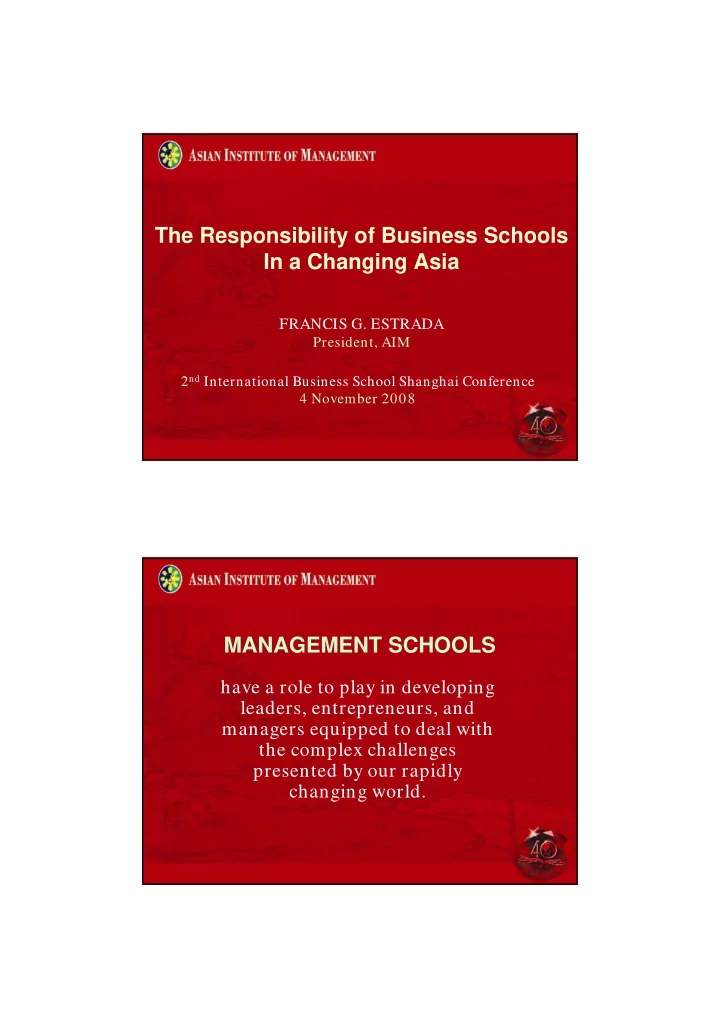

The Responsibility of Business Schools In a Changing Asia FRANCIS G. ESTRADA President, AIM 2 nd International Business School Shanghai Conference 4 November 2008 MANAGEMENT SCHOOLS have a role to play in developing leaders, entrepreneurs, and managers equipped to deal with the complex challenges presented by our rapidly changing world.
Management education in Asia must address 4 issues: A. The Growing Global Interdependence of Economies and the Demise of the Unipolar World • Develop programs in the context of Asia’s rapid economic integration • ADB: “Asia trades about as much with itself as Europe and America do with themselves.” A. Global Interdependence of Economies (cont’d) 1. Asia Today • 3.7 billion people • Combined GDP of more than US$10 trillion • 2/ 3 of global international reserves • Fastest-growing region in the world
A. Global Interdependence of Economies (cont’d) 2. Asia in the Next 40 Years • Asia will account for over half of global economic activity (from 20% today) • G7 economies’share will decline from 55% to under 30%. • China, Japan, and India will be at the forefront. Indonesia and Vietnam will be important players. • ASEAN Community by 2015 A. Global Interdependence of Economies (cont’d) 3. Role of Managem ent Schools in Asia In addition to management tools and knowledge, provide students a deep understanding of the differences among Asian cultures, values, economic structures, regulatory frameworks, and governance systems
B. Regional Integration 1. Econom ic Integration and 20 0 8 Financial Crisis • No more insulation from the rest of the world • 1997-98: Asian Financial Crisis • 2008: Subprime losses at major US and international financial institutions, which failed to provide appropriate regulatory framework B. Regional Economic Integration (cont’d) 1. Econom ic Integration and 20 0 8 Financial Crisis • Unipolar character of old financial architecture – despite severe structural economic problems, the US$ and US Treasury instruments were the only viable vehicles that could accommodate the huge surpluses of Asia and oil- producing countries. • East Asian economies’export-led growth policies must be tempered by encouraging domestic demand-driven growth.
B. Regional Economic Integration (cont’d) 2. Managem ent Schools in Asia Must Provide… a. An understanding of regional integration at the macro and firm levels b. Opportunity identification skills c. Skills and understanding to engage different cultures, values, business practices, and regulatory environments d. Ability to bridge cultural, racial, social, and political divides e. Ability to manage in a rapidly-changing environment f. Entrepreneurial disposition to develop solutions g. Understanding of and commitment to good governance C. Sustainable and Inclusive Development 1. Poverty • ADB: Principal challenge of Asia is the unfinished poverty agenda and rising inequality. • 2/ 3 of the world’s poor live in Asia • 600 M people have no access to clean water • 107 M children under 5 are underweight
C. Sustainable and Inclusive Development (cont’d) 2. Role of Managem ent Schools in Asia • Show students that poverty is not extraneous to enterprise. • Poverty reduction creates enormous opportunity, while poverty increase creates tensions that impede growth. C. Sustainable and Inclusive Development (cont’d) 3. Inclusive Growth • Inclusive, integrated, and sustainable growth • Predicated on improved communications, flow of information, connectivity, and rising expectations of civil society
D. Bridging Divides Consider these: 1. Poverty is probably the single most destructive economic, political, and social divide. Poverty – and its elimination – is everyone’s responsibility. 2. Human capital development is not measured exclusively in financial terms. 3. For business to create value over time, it must • Produce goods/ services that address market demand • Be engaged in an activity that does not damage life systems • Have a viable economic model • Enjoy multi-reinforcing relationship with its communities IMPORTANT THEMES A. Corporate Social Responsibility 1. Company initiatives aim to support important social programs for the communities they serve. 2. “Do well by doing good.” 3. AIM holds annual Asian Forum on Corporate Social Responsibility (in Singapore on Nov. 20-21, 2008).
IMPORTANT THEMES B. Good Governance 1. Response to excessive corruption and the clamor for transparency, fairness, and accountability 2. Movement seeks to establish universal code of conduct and best practices in governance. C. Public-Private Partnerships Public and private sectors are interdependent. Business schools must lead in researching, advocating, and developing ways to improve upon these themes. THANK YOU www.aim.ed u
Recommend
More recommend